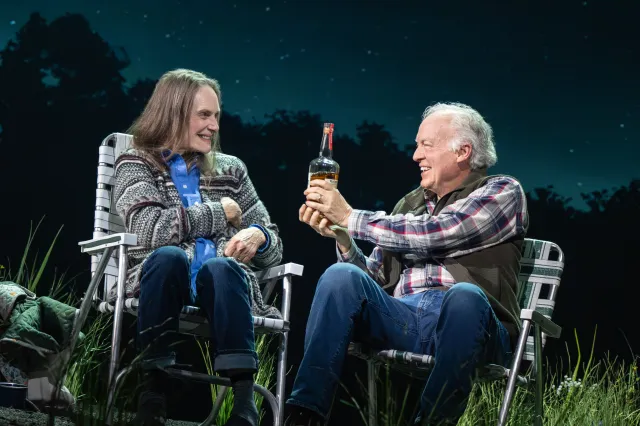
(© Joan Marcus)
“I felt like this is the play I should be writing at this time in my life, my career, and my time on the planet,” playwright Donald Margulies said about his new marriage drama, Lunar Eclipse, in a recent interview. It’s understandable: Margulies is 70 years old; he’s been married for more than 40 years, and he’s written plays for even longer. Like many people in his shoes, he’s recognizing the totality of his life, confronting his mortality, and still plowing ahead.
So too are the characters in Lunar Eclipse, a Second Stage production at the Pershing Square Signature Center, directed by Kate Whoriskey. They are a long-married couple, George (Reed Birney) and Em (Lisa Emery), not quite perfect for each other, but have become so over decades, and they’re sitting in the dark on the farm where George has spent his whole life awaiting a lunar eclipse. As the moon’s phases come and go, they find themselves reflecting on all that’s come before, while anticipating what will happen in the years they have left.
There’s an Our Town vibe to the reflectiveness, down to the names. Margulies hasn’t written a sequel, of course—in Thornton Wilder’s seminal work, Emily dies in childbirth, leaving George a widower—but instead, he pays homage to these salt-of-the-earth types who are deeply in love but have a hard time finding the words. George is strong and alpha; Em is his sounding board. His family has tilled this soil for generations, she became part of it because she had to. The ground is littered with the bones of their pets, whom George openly sobs over, but when it comes to mentioning their adopted son who died of a drug overdose, it’s Em who displays the most feeling.
Lunar Eclipse is a subtle play, tenderly staged by Whoriskey on a spacious, woodsy set by Walt Spangler (the breadth of the stage works against the intimacy of the piece, but that’s just a venue issue, not a flaw of the production). The design elements are uniformly spot on: Jennifer Moeller’s flannel-and-dungarees costumes, Sinan Refik Zafar’s crescendos of crickets, Amith Chandrashaker’s earthy lighting, and S. Katy Tucker’s celestial projections all work in harmony. Even Grace McLean’s gentle interstitial music conjures a specificity that is fully realized in practice, but not on the page.
Of course, it’s easier to achieve that kind of exacting precision when your cast is Reed Birney and Lisa Emery. These two exceptional actors have known each other in real life for decades, and they bring a natural camaraderie and warmth that fill in the text’s gaps and blank spaces. They communicate as much through glances and quiet, familial gestures as through dialogue, layering in an emotional depth that I don’t think is present in the script.
I found Lunar Eclipse to be sweet and sad, but also somewhat inert, never building to a peak. That might be true to life—not every conversation leads to a turning point—but onstage, the absence of a dramatic crescendo makes the 80 minutes tedious. There’s only so much crying about strangers’ dead dogs that one can be expected to invest in, even when those strangers are portrayed by two of New York City’s greatest actors.
This post was originally published on this site be sure to check out more of their content.








































